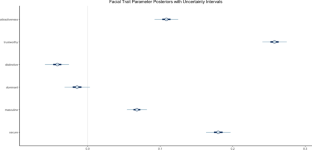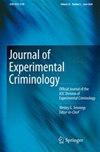If the face fits: predicting future promotions from police cadets’ facial traits
IF 1.8
2区 社会学
Q2 CRIMINOLOGY & PENOLOGY
引用次数: 1
Abstract
To evaluate the relationship between police cadets’ facial traits and their subsequent promotional success. Using archival police academy photographs, we use a two-phase experiment to evaluate the impact of facial traits on future promotional success. First, respondents (n = 507) view randomly selected photographs of cadets (observations = 15,669) and evaluate them for facial traits and perceived leadership ability. Second, respondents are presented with random dyads of differentially promoted recruits, and choose one based on the highest perceived leadership ability. We compare those leadership evaluations to the subsequent promotional success of the cadets featured in the photographs (observations = 5739). We employ Bayesian multilevel modeling throughout both phases. Facial traits are the primary driver of subject perceptions of leadership ability, and those perceptions successfully predict promotional success later in the cadets’ careers. When selecting for leadership potential based on police cadet photographs, respondents predict correct promotional choices at levels well above chance as measured by an AUC score of .70. Further, respondents’ evaluations successfully discriminate both between no promotion and lieutenant promotion, and sergeant versus lieutenant promotions. Promoting the most capable police officers is a critical feature of public service. Our findings cast a degree of doubt on the purportedly meritocratic foundations of police promotion and selection. Extra-legal information, such as facial features, predicts later promotional success.

如果脸型合适:根据警察学员的面部特征预测未来的晋升
目的:评价警校学员的面部特征与其随后的晋升成功之间的关系。使用档案警察学院的照片,我们使用两个阶段的实验来评估面部特征对未来促销成功的影响。首先,受访者(n = 507)观看随机选择的学员照片(观察值= 15,669),并评估他们的面部特征和感知领导能力。其次,随机向受访者展示两组不同晋升的新员工,并根据最高的领导能力来选择其中一组。我们将这些领导力评估与照片中学员随后的推广成功进行比较(观察值= 5739)。我们在这两个阶段都采用了贝叶斯多级建模。面部特征是被试对领导能力感知的主要驱动因素,这些感知成功地预测了学员日后职业生涯中的晋升成功。当根据警察学员照片选择领导潜力时,受访者预测正确的晋升选择的水平远高于机会,AUC得分为0.70。此外,被调查者的评价成功地区分了没有晋升和中尉晋升,以及中士和中尉晋升。提升最有能力的警察是公共服务的一个重要特征。我们的研究结果在一定程度上质疑了警察晋升和选拔的所谓精英基础。法律之外的信息,比如面部特征,预示着之后的促销成功。
本文章由计算机程序翻译,如有差异,请以英文原文为准。
求助全文
约1分钟内获得全文
求助全文
来源期刊

Journal of Experimental Criminology
CRIMINOLOGY & PENOLOGY-
CiteScore
6.20
自引率
6.70%
发文量
49
期刊介绍:
The Journal of Experimental Criminology focuses on high quality experimental and quasi-experimental research in the advancement of criminological theory and/or the development of evidence based crime and justice policy. The journal is also committed to the advancement of the science of systematic reviews and experimental methods in criminology and criminal justice. The journal seeks empirical papers on experimental and quasi-experimental studies, systematic reviews on substantive criminological and criminal justice issues, and methodological papers on experimentation and systematic review. The journal encourages submissions from scholars in the broad array of scientific disciplines that are concerned with criminology as well as crime and justice problems.
 求助内容:
求助内容: 应助结果提醒方式:
应助结果提醒方式:


